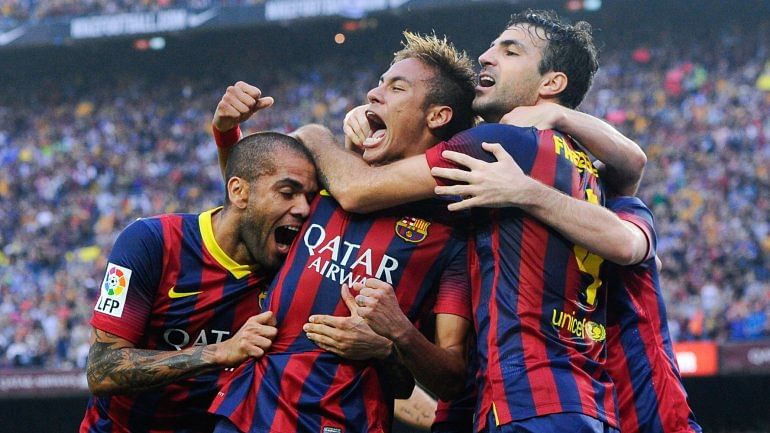
FC Barcelona: Possession isn’t everything

We’ve seen more direct Barcelona this season
Barcelona had always battered teams. That was just how La Liga was. They had the history, the allure, they were a big-city team, they had one of the world’s best footballing academies, and they had the money.
They were spurred only by their rivalry with Madrid-based rivals, and when Barcelona’s expensively-acquired superstars had conquered Real’s expensively-acquired superstars, there wasn’t much left for them to do. It was no longer enough to win trophies, and comfortable wins were routine.
Soon, scoring four or five on a weekly basis was the norm, and like a master seeking Godliness (or a junkie seeking a more severe high, depending on your perspective) they began to claim a kind of football which would affect the very nature of the game itself.
It’s difficult to pinpoint just where possession-obsession began, and where simply being a better team ended. If Guardiola foresaw Barcelona’s recent brand of side-passing, tiki-taka, end-of-the-rainbow football in 2008 then he was truly a visionary, but it’s easier to believe that he was merely following the philosophy of Cruyff’s triangles, Rijkaard’s tempo, and Barcelona’s quality to its inevitable conclusion. In his defence, the dispensation of Ronaldinho’s services indicate he may have been privy to the secret before others.
Ronaldinho was, and still is, a genius. Flitting in and out of games with his scarecrow smile, he didn’t care about the result, the defence, the 80,000 fans or the team. Genuinely unpredictable, he would stroll around flicking his straggly horsetail until inspiration took him, as if to say ‘hey, you can give me the ball now, I’ve just had an idea for a trick’ - not for him the safe option or pass completion stat.
When his nappy, ghetto-child locks were replaced by Messi’s ‘but I don’t want to cut me hair, mum‘ sullenness Barcelona severed ties with flashy, individualist, playground-emulated football, and paved the way for a brutally psychological kind of winning.
It was during Euro 2008, then World Cup 2010, that possession football, and with it Spain, stamped itself over European football. Excuses of TV money, unequal squads, and being a one-man-team were redundant. Despite Germany’s burgeoning vibrancy, Brazil’s new-found toughness, Holland’s diversity of quality, and Italy’s new look, Spain’s Catalan core took the trophies with what seemed like ease.
Here they were, a team of stars not noticeably better than their opponents, but with a type of football that had not been played at this level before. Granted, their journey’s were dotted with lucky wins (Chile) and fairly unconvincing 1-0?s (Germany), but a record of three out of three in international tournaments shows it was no fluke.
Once merely a side-effect of playing better, possession became the cause. As if goals could not be scored unless your possession percentage was above your opponents, teams began to pursue possession above all else.
Newly promoted Swansea became poster boys for keep-ball football; a symbol of hope, not only that such a style could be played on the damp fields of English football, but that you could survive the Premiership’s rough-and-tumble pace by doing so.
Conveniently ignored were teams like Stoke, who had achieved arguably even greater successes with fairly sub-standard players for years by playing the most physical and direct football this side of 1978.
Likewise Manchester United, who despite being ridden with problems in the midfield and outplayed plenty of times during the 2012-2013 season won the title on the back of incisive attacking threat and the pursuit of goals above defensive solidity or midfield control.